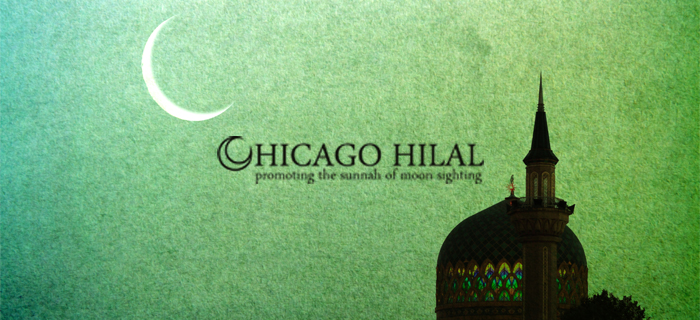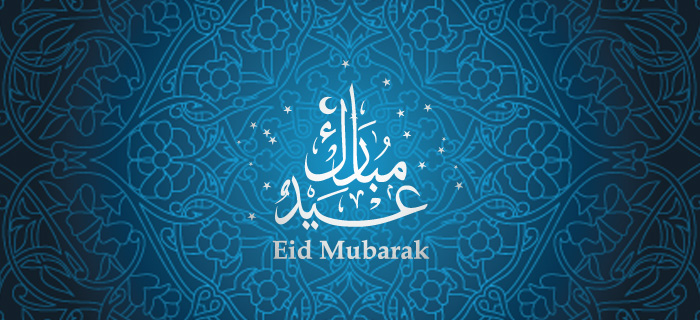Click HERE for PDF version
06/15/2015
.الحمد لله و كفى، و سلام على عباده الذين اصطفى، أمّا بعد، فالسلام عليكم و رحمة الله وبركاته
This announcement is on behalf of the Chicago Hilāl Committee regarding the sunnah method of keeping the sacred Islāmic calendar and the establishment of its dates and months. Al-ḥamdu lillāh, since 1974, Chicagoland had been unified under Chicago Hilāl as it was and continues to remain the only local body fulfilling the great responsibility of keeping the sacred Islamic calendar. Hundreds of masājid throughout the United States from as far away as New York, Florida, and California have trusted Chicago Hilāl’s decisions for over forty years.
Chicago Hilāl has been consistent in its policy of following the blessed sunnah of moonsighting with the intent of unifying the entire North American Muslim community on the teachings of Qur’ān and sunnah.
Recently, some former members of Chicago Hilāl and few other local masājid and organizations have decided to separate themselves from Chicago Hilāl, and to abandon the sunnah of moonsighting and adopt calculation as their criterion for setting the dates and months of the Islamic calendar. They have issued a joint public statement to this effect and are actively inviting Chicagoland Masajid to join them.
At this juncture, it must be clarified that Chicago Hilal’s sound methodology will not be abandoned due to the following values to which it holds steadfast:
- Commitment to Qur’ān: Allāh, Most High, says, “Therefore, whoever of you sights (shahida, lit. eye-witnesses) the month, let him fast it.”(Qur’ān, 2: 185)
- Commitment to the Sunnah: Bukhari narrates that the messenger of Allāh said “Fast for its [the new moon] sighting (ru’yah, lit. its naked-eye sighting) and break for its sighting, and if it is covered under cloud then complete the count of Shaʿbān as thirty days.” Note the clear and unambiguous directive in this hadith that the new moon must actually be seen in order to start the new month. Moreover, the Messenger of Allāh states that we must observe 30 days of the month of Shaʿbān if vision of the new moon is obscured by clouds, even if we know that the new moon is present behind the cloud cover.
- Commitment to Unity on the Sunnah and Abstaining from Reprehensible Innovations in Matters of Religion: Abu Dawūd and Tirmidhī narrate that the messenger of Allāh said “I command you to fear Allāh, and to listen to and obey your legitimate leaders. Whosoever of you should live after me, shall see much strife, so incumbent upon you is my sunnah and the sunnah of my rightly-guided successors. Hold fast to it, and bite down on it with your molar teeth. Beware of newly invented matters, for every innovation in religion is misguidance.” Note that the messenger of Allāh, and all four of his rightly guided successors, may Allāh be pleased with them, observed the sunnah of moonsighting.
- Fourteen Centuries of Scholarship: The above-mentioned four successors of the Messenger of Allāh, Abū Bakr, ʿUmar,‘Uthmān and ʿAlī, the rest of the companions, and reputable scholars of the Muslim Ummah from all four orthodox sunnī schools of thought throughout the past fourteen centuries have by scholarly consensus, or Ijmaʿ accepted moonsighting as the way to keep the sacred calendar of Islām, and have consistently rejected calculations as a public methodology for the keeping of the sacred calendar. Note that this is despite the fact that scientific calculation methods for the timing of the birth of the new moon have been known to Muslims for many centuries, as astronomical calculation is an ancient knowledge known to ancient peoples from at least the time of the Babylonians, who practiced calculations as early as the 18th century BC.
- Disparate Nature of Prayer and Ramadan Timings: The fact that it is permissible to rely on calculations for prayer times has no bearing on the issue of crescent sightings as they are based on completely different phenomena. The prayer times are established solely on the position of the sun relative to the earth and can be calculated with 100% accuracy while not a single prediction algorithm has been developed that accounts for the several factors that affect crescent visibility. Moreover, they carry completely different legal rulings. There is no verse of the Qur’ān or ḥadīth of the messenger of Allāh that unambiguously command the naked eye sighting of the prayer times; from the point of view of a specialist in the law of the sacred sharīʿah, the two matters are completely disparate and cannot be compared with one another.
- New Position: The ISNA Fiqh Council made an unprecedented and significant change in their Ramadan and ʿĪd policy in June 2006. They have decided, without any precedent in the sunnah, that there is no requirement of moon sighting at all. Preemptive declarations of Ramadan and the two ʿĪds have been made for the next ten years based solely on calculations, while Chicago Hilal in actuality maintains the same position that ISNA itself had up to this point held.
- Inconsistent Policy with regards to Eid Dates: The official position of the Fiqh Council of ISNA is to go with astronomical calculations for ʿĪd al-Fiṭr, whereas they adopt the Saudi sighting for ʿĪd al-Aḍḥā. They do not apply a consistent methodology for the keeping of the sacred calendar, which can lead to the distortion of the sacred Islamic calendar resulting in either 28 or 31 day months.
- Strident Opposition From Scholars in North America and Around the World: Even all the members of ISNA’s Fiqh Council itself did not agree on this major change, including Shaykh Mokhtar Maghraoui who, in fact, submitted his resignation over this issue and wrote a 27 page scholarly rebuttal of the new policy. Many other scholars and Islamic Sharīʿah Councils have also denounced this decision including Shaykh Hamza Yusuf of the Zaytuna College who wrote a detailed 75 page refutation of the ISNA’s Fiqh Council’s decision as well as Shaykh Mohammed Amin Kholwadia of Darul Qasim.
- Commitment to Islam before convenience: It may appear that ISNA’s Fiqh Council is attempting to unite the Ummah but such an appearance is arbitrary; in fact they are causing more fragmentation in the ummah all over North America. It is therefore our view that while unity is of paramount importance and every attempt should be made to make the practice of Islām easy for the people, unity and ease have to be achieved within the framework of the sunnah and not outside of it.
If you have any further questions or concerns, please contact the Chicago Hilāl, who would be happy to clear up any misunderstandings. For more information, please visit chicagohilal.org and follow @chicagohilal on twitter for the fastest updates on the new month.
May Allah SWT give us the tawfīq and courage to follow the teachings of the Book of Allāh and sunnah of the messenger of Allāh and to unite on them, to live by them, and to leave this world by them.
This Declaration is endorsed by the following scholars and Imams of Chicagoland:
1. Mufti Mohammed Nawalur Rahman – Rahmat-e-Alam Foundation
2. Mawlana Amin Kholwadia – Darul Qasim
3. Qari Abdul Mannan – Jamia Masjid
4. Mufti Gulaam Samdani Sahib – Masjid Rahmat-e-Alam
5. Mawlana Muhammad Maslihuddin – Masjid-e-Rahmat
6. Mufti Abdul Sattar Patel – Makki Masjid
7. Mawlana Abdul Aziz – Rahmat-e-Alam Foundation
8. Mawlana Aziz Ahmed – Elgin Masjid
9. Mawlana Abdul Haleem – Rahmat-e-Alam Foundation
10. Mawlana Jafar – Masjid-e-Rahmat
11. Mawlana Amjad Ali – Rahmat-e-Alam Foundation
12. Mawlana Ghuosuddin Qasmi – Berkeley
13. Mufti Minhajuddin Ahmed – Masjid DarusSalam
14. Mawlana Luqman Patel – ICC Chicago
15. Mufti Ayyub – Makki Masjid
16. Mawlana Muhammad Haneef Lakhi – Masjid Abu Bakr
17. Mawlana Ismail Patel – Al-Hira Foundation
18. Mawlana Arif Kamal – Instructor Darul Qasim
19. Mawlana Abdul Haq Mastan – Al-Masjid Foundation
20. Mawlana Abdul Raheem Tahir – Taleemul Foundation Romeoville
21. Imam Safwan Patel – Masjid Kawthar
22. Mufti Azeemuddin Ahmed – DarusSalam Foundation
23. Mawlana Ifdhal Khan – AIA Frankfurt
24. Imam Tahir Dawood – MSI Masjid
25. Mawlana Salman Husaini – Masjid Noor
26. Mawlana Asjad Ali Qasmi – Darul Uloom Chicago
27. Mufti Muhammad Akhlad Ali
28. Mawlana Wahab Nedaria
29. Mawlana Farooque – Masjid Tahoora
30. Mawlana Muhammad Ammar Khorjia
31. Mawlana Saqib – DarusSalam Foundation
32. Mawlana Muhammad Khorjia
33. Mawlana Inaamullah
34. Mawlana Omar Farooq – Darul Uloom Chicago
35. Mufti Ehzaz Ajmeri – DarusSalam Foundation
36. Imam Ilyas Faizi – ICC Des Plaines
37. Mawlana Akbar Khorjia – Masjid Tahoora
38. Mawlana Imran Husaini – Darul Imaan
39. Mawlana AtaurRehman Haji
40. Mawlana Sohail Bengali
41. Mawlana Ahsen Waseem – DarusSalam Foundation
42. Mawlana Adnaan Waseem – MSI Masjid
43. Mawlana Hamzah Maqbul – Muslim Association of Greater Rockford
44. Mawlana Ahteramul Haq – DarusSalam Foundation
45. Mawlana AbdurRahman Subedar – Furqan Academy
46. Imam Altaf – Harvey Masjid
47. Mufti Haroon Firdausi – Darul Uloom Chicago
48. Mawlana Abdur Rehman Haji
49. Mufti Abrar Mirza – Vice President Darul Hikmah
50. Qari Adnan – Dar-us-Sunnah Masjid and Community Center
51. Mawlana Ubaidullah Saleem – Masjidul Islam
52. Mawlana AbdurRahman Saleem – IIE
53. Mawlana Sulaiman Saleem – IIE
54. Mufti Yasir Nadeem – IIE
55. Mawlana Saad Saleem- IIE
56. Imam Siraj – Glen Ellyn Musalla
57. Qari Arshad Patel – Jamia Suffah
58. Mawlana Baseeruddin – Masjid Mustafa
59. Mawlana Muneer Zamman Abdul Fattah – MEC
60. Mawlana Imran Moola
61. Imam Abdul Basit – Masjid Suffah
62. Imam Mateen Peracha, ICBN
63. Imam Abu Emad, Masjid Ibrahim, Bloomington
64. Imam Hisham AlQaisi – Islamic Foundation Villa Park
65. Mawlana Abdul Hakeem Dickenson, Masjid Uthman
66. Shaykh Mostafa Muftah, Muslim Association of Bolingbrook
Chicagoland Masajid that follow Chicago Hilal Committee:
1. Islamic Society of Northwest Suburbs, Rolling Meadows
2. Islamic Foundation, Villa Park
3. Islamic Community Center of Des Plaines
4. Islamic Community Center of Elgin
5. Muslim Society Inc., Glendale Heights
6. Batavia Islamic Center, Batavia
7. Islamic Center of Chicago, Chicago
8. Masjid-e-Rahmat, Chicago
9. Masjid-e-Tahoora, Chicago
10. Naqshbandiya Foundation, Tinley Park
11. Masjid of Umar, Chicago
12. Islamic Community of Illinois, Bensenville
13. Wallen Community Center, Chicago
14. Harvey Islamic Center, Harvey
15. Masjid-Ul-Huda, Schaumberg
16. Al-Madina Mosque, West Chicago, IL
17. Al Medina Islamic Society, Chicago
18. Institute of Islamic Education, Elgin
19. Anjuman-e-Tahfuz-Aqida Ahles Sunnat ul Jammat
20. Al Hira Mosque, Wooddale
21. Islamic Community Center of Lake County, Gurnee
22. Masjid Al-Jameel, Addison
23. Islamic Center of Carry, IL
24. Makki Masjid, Chicago
25. Islamic Center of Elgin
26. Islamic Center of Western Suburbs
27. Masjid-e-Hammedia
28. Masjid Al Islam, Bolingbrook
29. Masjid Al Jumuah, Bolingbrook
30. Masjid Suffah, Skokie
31. DarusSalam Foundation, Lombard
32. Rahmat-e-Alam Foundation, Chicago
33. Masjid Mustafa, Westmont
34. Masjid Uthman, Lombard
35. Muslim Association of Greater Rockford
36. Darul Qasim, Glendale Heights
37. Masjid Ibrahim, Bloomington, IL
38. Islamic Center of Bloomington-Normal
39. Jamia Masjid, Chicago
40. Masjid-e-Noor, Chicago
41. Masjid Abu Bakr, Chicago
42. Islamic Center of Peoria
43. Islamic Foundation of Peoria
44. Masjid Wali Hasan, Decatur
45. Downtown Islamic Center, Chicago


